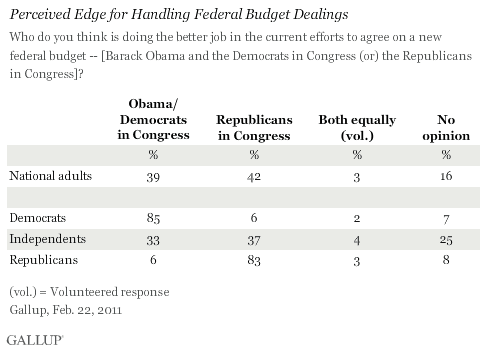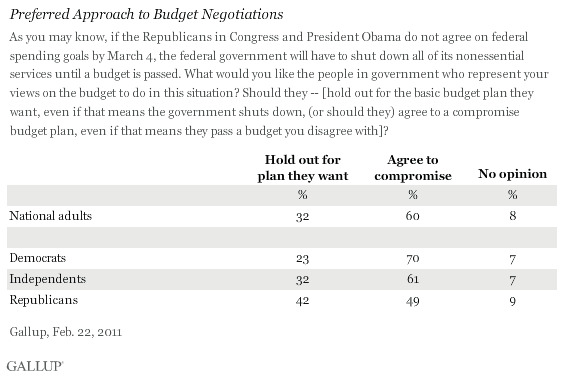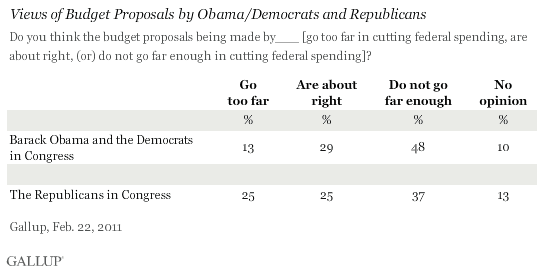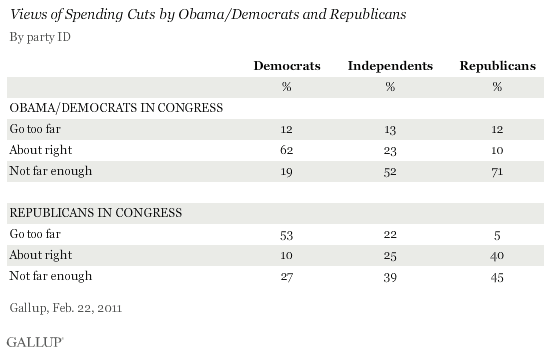PRINCETON, NJ -- Americans are closely divided over whether the Republicans in Congress (42%) or President Obama and the Democrats (39%) are doing the better job in the current efforts to agree on a new federal budget.

This finding comes from a new USA Today/���۴�ýsurvey conducted Feb. 22 as the two sides of the aisle in Washington jockey over spending cuts, and how far to push the threat of a government shutdown if they can't accomplish their budget goals.
The same poll indicates that Republican and Democratic leaders alike have important aspects of public opinion on their side in the mounting budget battle. Potentially most helpful to Democrats is the finding that, by 60% to 32%, more Americans want legislators who share their views on the budget to agree on a compromise budget rather than hold out for a budget they mostly agree with, which would trigger a government shutdown after March 4.
Republicans may have hoped that the potential of a government shutdown would pressure Democrats to accept deeper spending cuts than they have to date. However, the finding that most Americans are averse to a shutdown could ultimately strengthen Democrats' bargaining power.

At the same time, Republican leaders in Washington appear to have the public's backing to press for deeper spending cuts than what Obama and the Democrats have proposed -- 48% say Democratic plans do not go far enough in cutting federal spending, while 29% say they are about right.
The House recently passed a Republican budget plan that includes $61 billion in cuts -- much less than the $100 billion Republicans pledged before taking power, but much more than Democrats are comfortable with. The plurality of Americans, 37%, however, say Republicans' proposals in Congress also don't go far enough, while another 25% say they are about right.

Republicans' and Democrats' responses to these proposals generally follow expected partisan patterns. However, there is a notable difference in the balance of Republicans' and Democrats' satisfaction with their own party's budget plans. While the majority of Democrats, 62%, say the spending cuts Obama and the Democrats have proposed are "about right," the plurality of Republicans, 45%, say Republican leaders' budget cuts do not go far enough.

Bottom Line
Congress has barely a week to pass a 2011-2012 federal budget before hitting the March 4 deadline that would trigger a government shutdown. In the high-stakes political maneuvering taking place before then, public opinion largely supports Republicans' insistence on a plan that makes significant cuts in government spending, and this could put pressure on Democrats to meet them more than half way. At the same time, it may strengthen Democrats' power to bargain for fewer cuts as part of a compromise plan to avoid a government shutdown.
Results for this ���۴�ýpoll are based on telephone interviews conducted Feb. 22, 2011, on the ���۴�ýDaily tracking survey, with a random sample of 1,004 adults, aged 18 and older, living in all 50 U.S. states and the District of Columbia, selected using random-digit-dial sampling.
For results based on the total sample of national adults, one can say with 95% confidence that the maximum margin of sampling error is ±X percentage points.
Interviews are conducted with respondents on landline telephones and cellular phones, with interviews conducted in Spanish for respondents who are primarily Spanish-speaking. Each daily sample includes a minimum quota of 200 cell phone respondents and 800 landline respondents, with additional minimum quotas among landline respondents for gender within region. Landline respondents are chosen at random within each household on the basis of which member had the most recent birthday.
Samples are weighted by gender, age, race, Hispanic ethnicity, education, region, adults in the household, cell phone-only status, cell phone-mostly status, and phone lines. Demographic weighting targets are based on the March 2010 Current Population Survey figures for the aged 18 and older non-institutionalized population living in U.S. telephone households. All reported margins of sampling error include the computed design effects for weighting and sample design.
In addition to sampling error, question wording and practical difficulties in conducting surveys can introduce error or bias into the findings of public opinion polls.
Polls conducted entirely in one day, such as this one, are subject to additional error or bias note found in polls conducted over several days.
View methodology, full question results, and trend data.
For more details on Gallup's polling methodology, visit .
